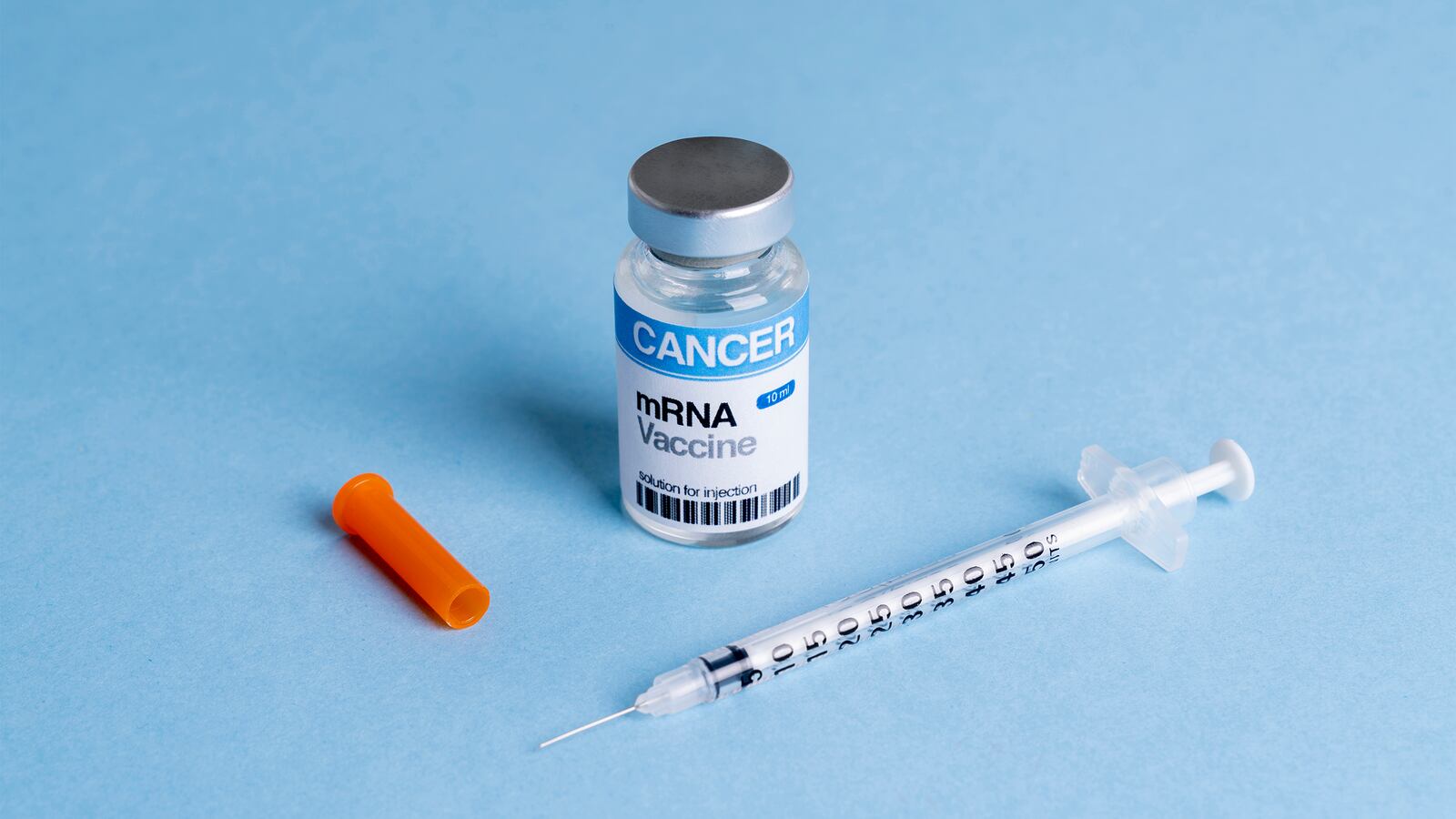The novel coronavirus could help us cure cancer. Well, certain cancers.
The COVID pandemic gave the pharmaceutical industry the push it needed to finally finish developing messenger-RNA technology so that companies such as Moderna and Pfizer could use the tech for its COVID vaccines.
Now the pharmaceutical industry is using the same mRNA platforms for cancer vaccines. Dozens of these new vaccines are in development—and experts say there’s a chance they’ll drive the biggest decrease in cancer mortality in decades.
It’s worth noting a key difference between mRNA shots for COVID versus mRNA shots for cancer. MRNA vaccines prevent COVID. They won’t prevent cancer. Instead, they’ll treat cancer after you’ve caught it. In that sense, “vaccine”—even though it’s the accepted term—is something of a misnomer when it comes to mRNA applications for cancer. “Therapy” might be a better term.
In any event, mRNA vaccines for cancer have been in the works for a couple of years now, but the first tangible sign of real progress came just last week. On Dec. 13, Massachusetts-based Moderna and partner Merck—the New Jersey pharma giant—announced the initial results of the first ever randomized human trial for an mRNA cancer vaccine.
The two companies enrolled 157 people with late-stage melanoma for the trial. Volunteers received either the antibody therapy Keytruda, or Keytruda combined with a new vaccine called mRNA-4157. Adding mRNA-4157 reduced the risk of recurrence or death by 44 percent, the companies reported.
The key to mRNA-4157, and any other mRNA cancer vaccine, is that it can be tailored for an individual patient. As its name implies, “messenger RNA” is just a medium that communicates a message. The message is a scrap of genetic material—RNA—that tells a person’s immune system to produce a particular, disease-fighting protein.
Developers can encode mRNA to produce a wide array of proteins. For, say, preventing COVID—or reducing different cancerous tumors. “The flexibility is extraordinarily attractive,” Elias Sayour, a University of Florida neurosurgeon whose RNA Engineering Laboratory is working on cancer vaccines, told The Daily Beast.
But the flexibility that makes an mRNA vaccine so attractive is also a problem. How do you know exactly what RNA to add to a particular patient’s vaccine? “Not all cancers are the same,” Sayour explained. “To overcome this, prediction algorithms are used to identify unique information in an individual's cancer that will be recognized by their immune system.”
MRNA was in development for nearly 50 years before COVID finally compelled governments to pump money into the effort, helping the industry finally finish the first mRNA vaccines two years ago. The basic platform for an mRNA cancer jab is actually pretty old. It’s the algorithms that are new.
“The manufacturing process starts with the identification of genetic mutations in a patient’s tumor cells that could give rise to neoantigens,” the U.S. National Cancer Institute explained. Neoantigens are proteins that form on cancer cells. “Computer algorithms then predict which neoantigens are most likely to bind to receptors on T-cells and stimulate an immune response,” the institute added.
In theory, an mRNA-maker could produce a personalized cancer vaccine in as little as four weeks, Sayour said. In practice, we need a lot more mutation-detecting algorithms and a lot more testing before mRNA vaccines are ready for routine use on cancers.
Sayour stressed that mRNA will probably work better for some cancers than for others. Not all cancers are “immunogenic,” meaning they trigger an immune response. Without an immune response, we might not know which protein to encode in an mRNA jab. “MRNA vaccines are likely to work in cancers like melanoma that are considered immunogenic,” Sayour explained. Temper your expectations for other cancers.
There are other possible limitations on mRNA as a cure for cancer. Henry Wang, a chemical engineering professor who studies vaccine production at the University of Michigan, told The Daily Beast he’s worried about production.
You can’t churn out mRNA cancer shots the same way you churn out mRNA shots for COVID. How do you scale and manage production of a drug that requires such careful and detailed individualization? “It creates an entirely different set of [quality-control] and manufacturing issues,” Wang said.
There’s also the issue of cost. Because they’re essentially boutique products, each vaccine would be designed for one or a few people and manufactured in small quantities. That means mRNA cancer jabs may end up being really expensive. It’s possible mRNA will work great against some or many cancers, but be too pricey for most people. “Someone has to address the issue of cost versus benefit,” Wang said.
Sayour, for one, said he’s optimistic. Even taking into account the problems of customization and production, mRNA seems to be our best near-term pharmaceutical tool for reducing cancer deaths. “It seems to have the best balance of commercialization and personalization.”
If pharmaceutical developers can write a host of algorithms, complete large-scale trials, figure out the production processes and thread the cost-benefit needle, cancer vaccines might be viable—and save a lot of lives.
Even if they can’t, and mRNA jabs for cancer fall flat, the basic tech could still have a bright future. Moderna is already working on mRNA jabs for around two dozen diseases, including herpes and Zika. German firm BioNTech SE is even working up mRNA for multiple sclerosis.
MRNA got its start preventing COVID. Treating cancer might be next. It’s a safe bet that neither disease will be the last to square off with this particular tech.







